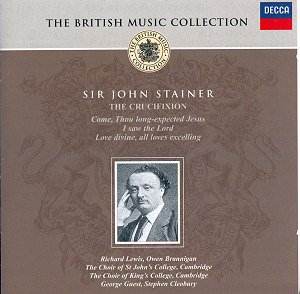Stainerís The Crucifixion has survived 115 years
of critical calumny and disdain and seems likely to survive for at least
another 115. It has fulfilled a need as a devotional cantata for small,
less experienced choirs, specifically church choirs, and has indeed
had many imitators, some of them more durable than others. It is, then,
its usefulness that has ensured its longevity.
To say, therefore, that The Crucifixion is poor
manís Mendelssohn (and Maunderís Olivet to Calvary Ė much inferior
Ė is poor manís Gounod and Percy Fletcherís Passion of Christ
is poor manís Elgar) is to miss the point. Such is The Crucifixionís
place in the social history of music in England that experienced choirs
have taken it up and in my experience have usually enjoyed it, which
brings me to this recording, which dated originally from 1961. It would
be hard to find from that era better musicians than perform it here
which, let it be said, they do with no hint of condescension.
Richard Lewisís lyrical tenor, beloved of many, is
a genuinely moving narrator of what is for many the greatest story of
all and the bass Owen Branniganís rich delivery, equally well remembered,
has magnificent authority. That the choir is that of St. Johnís College
Cambridge under George Guest means that this is an all-male performance,
which might be frowned on in these days of gender equality. More importantly,
if just as controversially, this brings a cathedral-type sound to what
is basically a small parish church work. But the singing, not least
of the moving unaccompanied chorus "God So Loved the World"
(if Stainer had composed nothing else, he would be worth remembering)
disarms criticism, though I do have reservations about the hymns. These
like the chorales in a Bach Passion, are central to the structure (and
Stainer, unlike Bach, even composed all five tunes) but modern usage
might dictate tempi a touch faster than we have here. The organist in
The Crucifixion has no easy task for he must be both a discreet
accompanist and also project an orchestral-type commentary at moments
of drama. Brian Runnett, later Organist of Norwich Cathedral and sadly
cut off in his prime in a car accident around 1970, fulfils both functions
to perfection and indeed provides some striking moments, especially
in "Fling Wide the Gates".
A well filled CD is completed by three more of Stainerís
sacred pieces: his best known (and sometimes dramatic) anthem I Saw
the Lord and two hymns Come Thou is Cross of Jesus
from The Crucifixion to different words (and is a smidgen
faster) while Love Divine, sung by St. Johnís rivals,
just up the road at Kingís, under Stephen Cleobury is a much later recording
dating from 1985.
Philip L Scowcroft
see also review by Jonathon
Woolf


